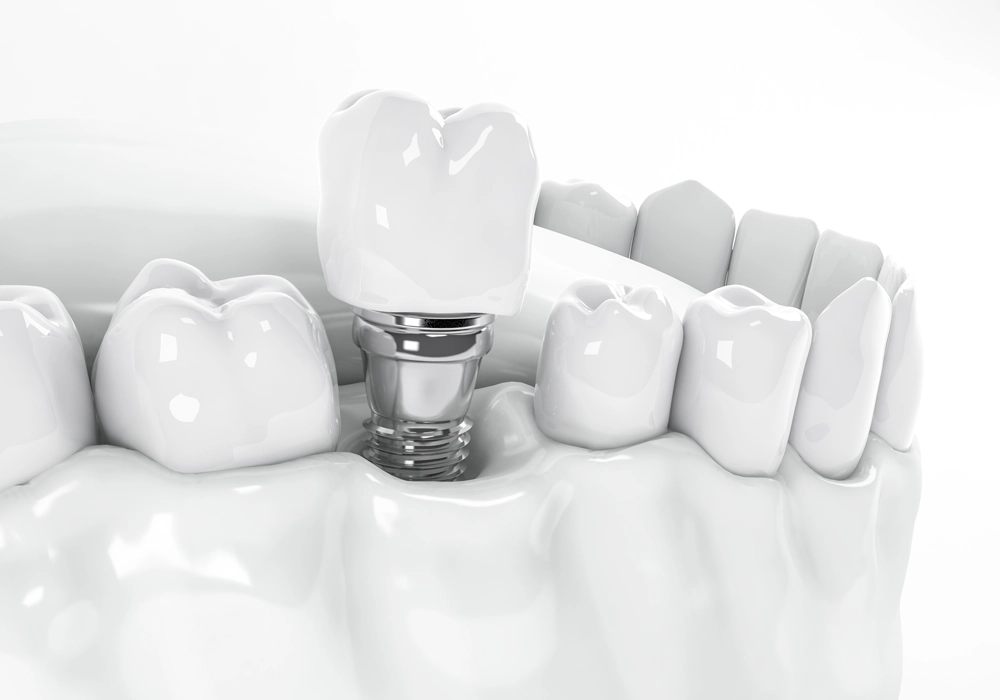Implant
Safe and Accurate Implant positioning
Dental Implant
The dental implant therapy consists of the installation of artificial dental root(fixture) and the connection of dental crown, the tooth head, to the root.
Dental implants are stronger than bridges and dentures and the recent innovations can make us do much safer and more comfortable procedures.
We employ 3D CBCT scanning, which gives us more understanding of important anatomic structure : the volume of jaw bone(alveolar bone) and nerves and blood vessels. Combining CT data and dental models, the surgical guide (HiOssen One Guide) is fabricated. With the surgical guide, we can do the safer and more precise surgery to patients.

What Can I Expect During the Dental Implant Procedure?
If you’re about to get dental implants for the first time, you may be nervous. However, the dental implant procedure is being done keeping patients’ safety, so there’s really nothing to worry about. But, to put your mind at ease, it can help to know what you should expect with dental implants. Check out this guide to learn what to expect with the dental implant procedure.
First of all, you have to report all medical issues of your to your dentist. Some patients may need any prophylactic procedures to avoid any risks that may follow surgery. Rarely,
some are not allowed to have implant surgery. Do not hesitate to consult with your dentist about it.
Typically, your dentist will provide you with some instructions to follow before the operation.
Your instructions may include:
- Rinsing your mouth with a special anti-bacterial mouthwash
- Taking antibiotics a few days leading up to the procedure as a preventative measure
- Eating a hearty breakfast the day of the surgery, unless you plan to undergo IV sedation, in which case you’ll need to stop eating after midnight
- Finding someone who can take you to the appointment and drive you home
On the day of the surgery, you’ll head to the dentist’s office. The surgery will take place in two phases.
Here’s what happens in each one:
During the first phase, you’ll be given local anesthesia or IV sedation. This will help to thoroughly numb your mouth and take away some of the pain.
After the anesthesia has set in, the dentist will make an incision in your gums where the implant will be placed. Then, the dentist will use a drill (don’t worry, it’s not as scary as it sounds) to make space for the implant.
Your dentist will then screw the implant into place using an implant drill or a hand tool.
Once the implant is in place, another component will be added to make sure the implant stays in place. Then, the gums will be closed over the implant. A stitch or two may also be added.
Implants will be integrated with your own bone in 4-6 months, depending on your health condition and bone quality. It is a very biological and physiological time, during which your bone will be remodelled and tightly bonded with implants. We call it ‘Osseointegration’.
The second phase of the dental implant procedure begins with re-exposing the implant. The dentist will make another small incision in your gums in order to expose the implant.
Then, a small extension will be placed on the implant in order to take an impression. This piece will be used by the lab to fit your new crown.
Then, your dentist will schedule a series of appointments to fit your new dental implant crown. Typically, during these appointments, the dentist will make impressions with your teeth in order to make sure the crown is properly aligned.
Finally, your new crown will be put in place.
After the surgery, it’s normal to experience some discomfort, swelling, and bruising depending on your gum condition and difficulty of implant surgery. Usually, any discomfort you feel can be treated with over the counter pain medications.
Just like regular teeth, dental implants need regular maintenance in order to stay healthy. You should brush and floss your teeth as recommended, and schedule a checkup with your dentist every 6 months.
As you can see, there really isn’t anything to fear with the dental implant procedure.
If you have any questions about the dental implant procedure, comment below. And, if you need to make an appointment for your dental implants, contact us today.




